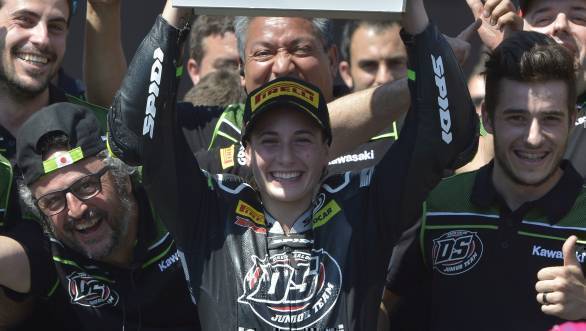It's a (wo)man's world
On September 30, 2018, Ana Carrasco won the FIM Supersport 300 World Championship title. She took home the championship by one single point, after finishing thirteenth in the final race of the season. In doing so, she became the first woman to win a major motorcycle racing series, which in itself makes her a pretty accomplished individual. But if that's not enough, Carrasco also studies law at the Universidad Católica San Antonio de Murcia in Spain. Which means that at the tender age of 21, she's already utilising more of her brain and brawn than most of us ever will over the course of our entire lives. Ana Carrasco is a very impressive person indeed.

If you look at Carrasco's tweets over the course of the Magny-Cours season finale, you'll see a most remarkable sequence emerge. On September 29, having qualified no higher than 25th for the final race of the season, is a tweet that reads "Working very hard to find a solution! We never give up, we will fight until the end! #pinkwarrior". A day later, she posts her next tweet that simply reads, "WORLD CHAMPION SSP300". There are plenty of images after that of not just Carrasco, but of her entire DS Junior racing team wearing t-shirts that say "Ride like a girl". And why not!
Her accomplishment in winning the Supersport 300 title comes after years of hard work, and years of "firsts" for a female rider. But in winning the title, Carrasco has done something that many youngsters, both boys and girls, around the world dream of. She's held fast to her hopes and ambitions, she's set about accomplishing her goals on her own terms, and she's played by the rules and beaten everyone else on the grid. All she's asked for is a fair shot at doing what she always knew she could do. A chance to demonstrate to the world what she was capable of.
And asking for a fair shot at one's dreams really is all that most people want. It's the common factor that binds almost all of us - men and women from all sections of society, from all generations, of all sizes and shapes and colours. When it comes right down to it, most human beings just want to be allowed to do what it is that we want to do. We all just want to be allowed to live our lives. And, so long as we aren't harming anyone else in the process, this is an extremely fair ask.
Back in the 1980s, when Navaz Bhathena would go rallying, she exhibited more prowess behind the wheel of a Gypsy than most, and she was generally acknowledged to be a terrific rally driver and racer, without the word "woman" being tacked on as an epithet. More recently, just over the course of the last seven years, we've seen young Mira Erda go from being a young 'un in the micromax category of the national karting championship, to becoming part of the grid of drivers racing the Euro JK single-seaters. We've seen Aishwarya Pissay being inducted into the TVS Racing squad that was sent to the Baja Aragon. And we've seen Anam Hashim, despite several cases of road rash get back on her motorcycle and carry right on stunting. Just a few examples of Indian women who very rightly subscribe to the belief that once the balaclava, helmet, and gloves come on, gender goes right out the window.
And even though there aren't as many women in Indian motorsport as we'd like to see, I still hold onto the hope that things will change. That with each season of various national championships, more and more young women will want to get behind the wheel or the 'bars, and they'll carry on moving from strength to strength, getting by on merit and merit alone.
In fact, a part of me also wishes that the status that women in Indian motorsport enjoy, was also representative of the status that women enjoy in Indian society in general. Unfortunately, it isn't. As is in evidence from the very pertinent conversation that has begun in the country right now, with horror stories emerging on a regular basis, that illustrate just how deep-rooted misogyny and gender bias is in the Indian context. Not to mention the fact that violence against women is something that happens on a day-to-day basis. I'm willing to bet that every single one of you reading this column, knows of some act of violence perpetrated against a human being, most likely a woman, whom you've met at least once in real life.
You might ask why I'm choosing to talk about gender politics, and violence against women, in a motorsport column. The answer is because ignoring reality isn't going to change it. Problems can't be magicked away. And the only way to make sure that change is brought about, is from having a conversation. And before that, from being willing to acknowledge that change is required in our country. Because it's not enough to be good people ourselves, to know that we've done nothing wrong, and to pretend that nothing bad happens in the circles that we move in. After all, how can we expect to produce great women in motorsport, who will go on to win very many races and championships, when we can't ensure their safety in getting to a racetrack in the first place?